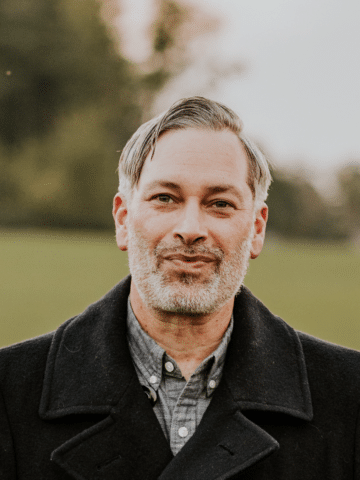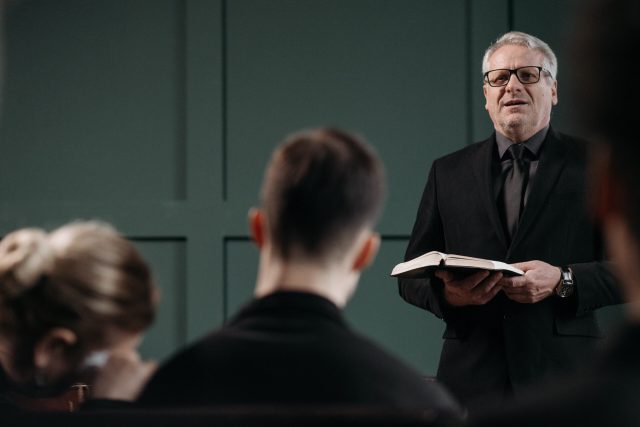Article
Embracing Your Humanity as a Gift
To ignore the basic components of your creatureliness and your humanity is, in some way, to have a misunderstanding of God’s purpose and pleasure in creating you.

You were not born a pastor, you were born a person.
As Charles Dickens once said, “This must be distinctly understood, or nothing wonderful can come of the story I am going to relate.”
Without receiving yourself as a person, the pastor part of you–which is found somewhere inside of that–has no chance but to eventually become a persona, which is the aspect of someone’s character that is presented to or perceived by others. When we choose to ignore our God-gifted humanity and present ourselves as pastors instead of persons, we fall into a cycle of exhaustion that comes with maintaining a pastoral persona. Our status as imago-dei becomes more like imaginary-dei.
Who Are You?
One of the key scenes in the movie Hook is when Angela Darling (played by Maggie Smith) asks Peter Pan (played by Robin Williams), “Peter, don’t you remember who you are?” We would do well to ask ourselves the same question often: Pastor, do you remember who you are?
The answer to that question is the only way to answer the question Adam was asked when “the Lord God called to the man and said to him, “Where are you?” (Genesis 3:9) We’re not going to know where we are when we don’t know who we are. Do you envision the Lord asking you this question because it’s not just related to your sin; it’s related to your person? Adam was still a person when God asked Where are you? Adam’s sin thrust his humanity into disorder, but it didn’t make his humanity incidental. In fact, Adam’s sin made Adam less-than-human because he had tried to become more-than-human by caving into his less-than-human desires. Adam’s humanity needed to be restored, not relegated to the trash heap of failed experiments. At no time did God the Father look at the Son and the Holy Spirit and say, “Looks like we need to go back to the drawing board on this one.” Remember how the creation of man was described:
“Then the Lord God formed the man of dust from the ground and breathed into his nostrils the breath of life, and the man became a living creature” (Genesis 2:7).
Formed, breathed, became. Became what? A living creature! Not a living legend, not a living warrior, not a living multitasker, not a living pastor, not a living entrepreneurial tycoon, not a living anything other than a creature. What does it mean to be a living creature? Do you ever ask yourself that? What are the basic requirements of a creature who is formed, breathed into, and then becomes an image bearer of God? In some sense, this question undergirds the existential questions of life, such as, “What is my purpose?” “Why was I put on earth?” “What is the meaning of my life?” You have no ability to answer these questions the way God intended when you move beyond your creatureliness like Adam tried to do. He attempted to be more than human, and his humanity became instantly distorted.
Fully Human Is a Gift
We need to be fully human so that we can become more wholly human. So, we begin this journey back from the allure of platform building, persona acquiring, and pastor-being, by embracing our humanity, exploring our humanity, and exalting the Lord for our humanity. Chuck Degroat said, “Becoming whole is a journey, a risky one, a ‘wild night.’ In the Christian contemplative tradition, this wild night is ‘the dark night of the soul,’ as the sixteenth-century poet St. John of the Cross called it. It is the night that strips you of everything that is not you. It is a gift, God’s gift.”
We begin to receive our humility by embracing this shocking but soulful truth: neediness is connected to godliness.
Here’s what is hard to get our heads wrapped around: our creaturely needs are not God’s plan B. Your limitations given to you were intended to be life-sized—they’re not something you’re meant to push through, something to grow out of, or something that spiritual maturity finally helps you bypass. Take a look at yourself: You can’t live physically without food and water, you can’t grow spiritually without God’s Word, and you can’t thrive emotionally without companionship. To ignore the basic components of your creatureliness and your humanity is, in some way, to have a misunderstanding of God’s purpose and pleasure in creating you.
Because a desire to be something God never dreamed or designed you to be is what Satan used as a lure to deceive Adam and Eve. Limitations are not qualities that have been held back from you by the hand of a stingy and controlling God. Your limitations are not stolen properties that need to be reclaimed. They are life-sized, meaning they were gifted to you by God to define and encompass your entire being. They are part and parcel of who you are. To attempt to live as more-than-humans is how we become less-than-human.
The Sinful Crave to Be ‘More’
I am not less than an octopus because I don’t have 8 arms and can’t camouflage myself at will. For me to attempt to do what only an 8-armed octopus can do would verge on insanity. You would say, “Ronnie, stop, you’re not an octopus!” But my actions would say, “I know, and God made a mistake by not giving me 8 arms. Think what I could accomplish with 8 arms?” To try to do what only an octopus can do would not allow me to do all I can do as a human, non-octopus being.
That might be the worst illustration ever written.
It sounds ridiculous until we realize that this desire to be more than human has its origin story in Eden, with implications that led to the death of a species and the decay of a universe.
“You will not surely die. For God knows that when you eat of it your eyes will be opened, and you will be like God, knowing good and evil” (Genesis 3:4-5).
Whenever we deny our humanity, whenever we embrace the persona of pastor instead of a person made in God’s image, we are in some way saying, I will not surely die, I will surely be God.
Humility of Humanity
So…how can you treasure your humanity and embrace it as a gift?
- Offer your humanity to God.
- Offer your humanity to your leaders.
- Offer your humanity to your family and friends.
All of these are acts of humility, which is the fruit of humanity. Typically, only a child lacks gratitude when they don’t receive a gift they wanted or asked for. But we inadvertently do this with the Lord when we don’t receive our formed, breathed-out, living creature status as a gift. “But I want to be like God!” as the serpent whispers, “And who said you couldn’t be?”
Here’s the thing, you already are like God as a human being made in his image. The real problem is that you want to be God, which is why the path to being wholly human must be formed by humility–which is what we’ll discuss in our next post.




